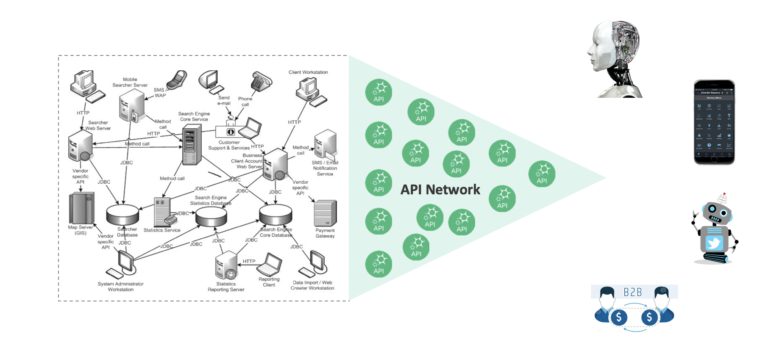10 Reasons You Need Magento API Service
An Application Programming Interface Magento API Integration Service is a communication and networking interface that connects two or more software programs.
Magento API Integration Service is a type of seamless connectivity that enables businesses to automate business processes and improve data sharing and integration across several apps and systems. A program like Trip Advisor, for example, uses APIs to gather data from numerous airlines and hotels. Another example is the synchronization of leads between marketing automation systems like Marketo and CRMs like Salesforce so that Sales may work on them.
Magento API Integration Service are now a requirement of modern enterprise IT. It’s not a question of whether APIs are required; rather, it’s a question of how many are required and how they will be generated and publicized. There are already at least 23,500 APIs available, and this number may only be the tip of the iceberg.
As a result, businesses today have a plethora of alternatives when it comes to building APIs and determining how to integrate them. However, just one option stands out for its sheer speed and scalability: the API integration platform.

Here are 10 reasons why an API integration platform is ideal for your organization:
1. connect cloud apps.
Today, there are hundreds, if not thousands, of cloud apps available. The organization has been thoroughly infiltrated by this technology. Companies with 100-250 people use 99 apps across their business, whereas companies with over 1000 employees use over 203 apps, according to the 2019 Annual SaaS Trends Report.
Magento API Integration Service integrations have become the de facto standard for linking cloud programs. Most old integration technology, such as enterprise service buses (ESBs), was built for the on-premise era and struggles to enable current API connectivity outside of the firewall. Because the weight of programs has shifted to the cloud, it’s no longer practical to keep the platform that connects all of these clouds behind your firewall. Simply put, to connect today’s current cloud APIs, an API Integration platform born in the cloud is required.
2. To Connect your best-of-breed solutions.
Think about the normal finance department at your ordinary firm. Consider all the tasks that fall on these teams. Everything from accounts payable, invoices, taxes, insurance payouts and more is under their control. While there are some programs out there that claim to accomplish everything an average finance department would need, such solution is likely both pricey and not particularly good at all of these duties.
Instead, many departments—including 96 percent of account and finance teams—are constructing their own solutions, assembling their own platforms, by putting together best-of-breed solutions that handle specific tasks and data sets. With an Magento API Integration Service connection platform, departments are able to effortlessly link the greatest apps and resources available. This manner, companies can replace all-encompassing, yet inadequate solutions with a clean and extremely effective stack.
3. Easily create new APIs.
Until recently, if you required an API, you had two main options. You either used what was already accessible (i.e., what a SaaS vendor or another third party has developed) or you built one from scratch. Both options could be disastrous. Assuming an API is available from an outside source, it could be limited in its capability or use. Building one from scratch via code is far from ideal either, as that is often a time-consuming and tough operation.
By definition, API integrations done via an Integration Platform as a Service (iPaaS) platform can give an easier option. With only the click of a few clicks, you can develop an API from an existing integration, saving you time and money while also finally fully leveraging your existing technological investments.
4. Get value from existing and legacy data sources.
At many firms, especially older ones, data that is more than a year or even a few months old just ends up on a database somewhere. It’s “collecting dust,” remaining relatively inert. Part of the reason older data sometimes remains unused is that it might be difficult to retrieve and subsequently integrated into current systems.
API integration tools or platforms can be immensely valuable in this circumstance as well. With such a system, an enterprise can create its own APIs just for internal uses. This helps a firm to more quickly pull data from older servers and databases as well as reuse business logic and workflows that are currently running.
5. Compose new apps with ease Way.
Real fact: When Facebook purchased Instagram in 2012, the photo-sharing social network had only 13 employees. Instagram is not necessarily an outlier here either. After all, WhatsApp had 55 staff employees in 2014 when it was bought by Facebook. How were these firms able to produce hugely successful apps with such small teams?
APIs. That’s how.
Many popular apps at their core comprise of previously existing technology that is connected together in a unique method via APIs. Photo filters and social media technology existed before Instagram, but they were able to bundle them together in a different way using Magento API Integration Service.
New apps can be composed in the exact same way. Through the use of an API integration platform, teams may rapidly and simply link disparate technology or expose existing integrations as APIs or micro services to bring new apps to market.
6. Make your teams more strategic.
At firms where API creation is a manual exercise, they then have to employ a team of developers and other IT staff to get everything up and running. Similarly, business divisions that lack clear, integrated stacks often recruit staff people expressly to handle one or two apps.
With an API integration platform in place, not only can that team of developers spend their energies elsewhere on strategic initiatives (say, building new revenue-generating apps, for instance), but typically fewer people are needed to maintain every department productive.
7. Improve team productivity.
Automation of connectivity between applications and data sources via API integrations is a tremendous productivity boost for developers, coders, and other IT department personnel. The hours that would have previously been spent designing, administering, overseeing, and correcting APIs can now be used for something else.
Other enterprise departments profit from API integration solutions in the same way. Not only does this technology make stacks possible, but it also allows non-technical teams to develop and administer their own APIs if they so wish.
8. API integration platform makes it easier than managing each API individually.
Even if the API was established by a third party, developers or other IT staff members in the company are still responsible for oversight and maintenance of that API when employing more manual API building methods. Keeping track of all the APIs in place as their use grows can be an onerous and time-consuming task.
API integration platforms, on the other hand, can help to alleviate this administrative strain. API integration technologies simplify management, security, and overview operations by acting as a single pane of glass for all deployed and generated APIs.
9. it’s better than doing it alone.
Businesses often have no one to turn to for help, whether they are using self-created or third-party APIs. Outside-party APIs may include user guides and documentation, but you’ll have a hard time getting in touch with Google or Amazon for specific questions.
API integration platform vendors frequently have in-house experts who can be consulted if needed. This type of assistance can go a long way toward ensuring that a company makes the most of its APIs and other IT investments.
10. API integration platform future-proofs enterprise integration.
Over the last decade, technology has advanced at a breakneck pace, with no indications of slowing down. Machine learning, wearable, and the Internet of Things (IoT) are just a few of the tech innovations that will have a significant impact on enterprise IT in the future.
With an API integration platform in place, businesses can be confident that they will be able to properly integrate new technologies as they develop.












